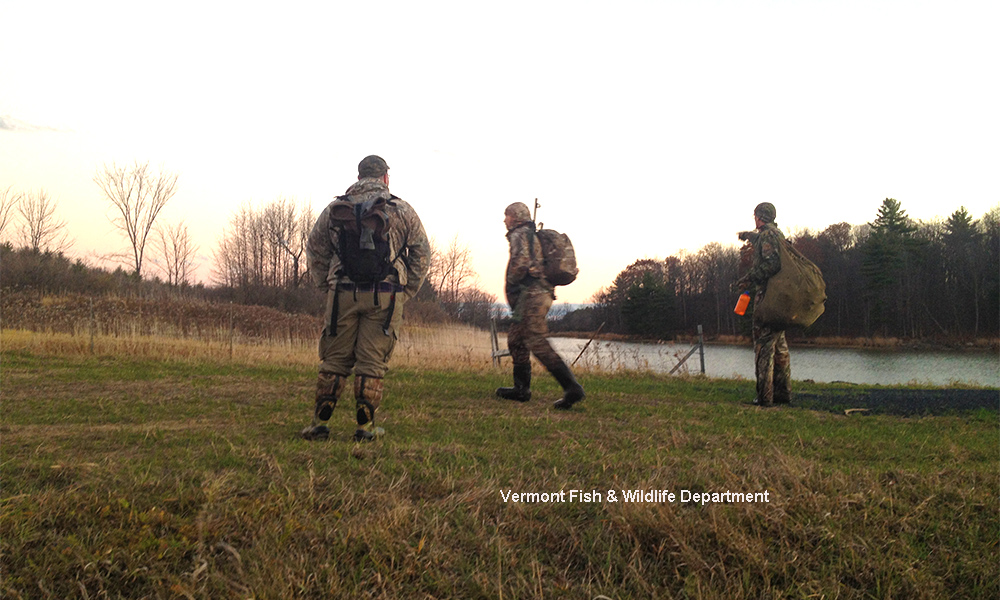Hunters’ Attitudes Towards a Hypothetical Return of Wolves to Vermont
Oct. 14th 2020The last known wolf to inhabit New England was shot in 1887 in New Hampshire. Since then, although other wolves have come through the region, there have not been any permanent inhabitants, even though forests of the Northeast were once their home. However, wolves have continued to inhabit neighboring Quebec. Centuries ago, wolves played an important ecological role throughout the region by balancing food web dynamics and predator-prey relationships. Though they are a predator feared by many, wolves helped to maintain structure and stability in New England’s ecosystems.
Wolf eradication in the United States began in the 1600s, continued until the 1970s, and ceased with the passage of the Endangered Species Act of 1973 which protected wolves. Although controversial, wolves were reintroduced into Yellowstone National Park in 1995. This reintroduction prompted studies of interactions between wolves and humans and of impacts on ecosystems and other wildlife.
While there is no active movement to reintroduce wolves to Vermont, natural dispersal of wolves from Quebec is conceivable. University of Vermont (UVM) researchers with interests in wildlife, hunting, and social perceptions wanted to learn about the attitudes of Vermont hunters towards a hypothetical recolonization by wolves.
In Vermont, hunting is a major outdoor recreation activity that generates revenue for the state and helps to control populations of small and big game. Hunters therefore have an influential voice in policy creation and decision-making regarding wildlife in the state. As a result, hunters are key stakeholders to involve when considering recolonization by wildlife to understand their attitudes towards such an event and the decisions involved.
To examine hunters’ viewpoints towards a hypothetical reintroduction of wolves into Vermont, Nelson Grima, John Brainard, and Brendan Fisher, a research team from the UVM Rubenstein School of Environment and Natural Resources, interviewed hunters throughout the state to analyze and understand their feelings towards wolves. Their goal was to determine how hunters’ attitudes towards wolves may shape responses and decision-making surrounding hypothetical wolf movement into Vermont and to gain an understanding of what factors may contribute to these attitudes.
The researchers conducted a survey, completed by over 200 hunters in the region, to explore hunters’ attitudes towards wolves and their knowledge about the species. To devise the online questionnaire, the research team began by drawing from expert interviews with 12 hunters across Vermont.
From the survey, the team found that 57% of hunters had negative attitudes towards wolves while 28.5% had positive attitudes. More than three-quarters of the hunting community (76%) were against a hypothetical reintroduction of wolves into Vermont. This dropped to 60% if Vermonters were compensated for damage caused by wolves (e.g. loss of livestock), and even further to 49% if they were allowed to hunt the wolves. Despite one-third of hunters reporting being fearful if wolves lived near their homes, 43% of hunters expressed that seeing a wolf in the wild would be one of the greatest outdoor experiences of their lives.
Interestingly, the researchers also found a positive correlation between knowledge of wolves and hunters’ attitudes, specifically that negative feelings towards wolves correlated with having lesser knowledge of wolf ecology. In particular, negative attitudes seemed to revolve around perceptions about the dangers of wolves to humans and threats to other wildlife such as deer. The research team noted that in the last 118 years in the United States and Canada, there have been 27 predatory attacks and close encounters between humans and wolves, with 2 fatalities. Additionally, they explained that a potential wolf population within the estimated area of wolf habitat in Vermont would predate less than 7% of the total deer hunted by people.
In sum, the findings from this study suggest that most hunters in Vermont hold negative attitudes towards wolves, though these attitudes may be influenced by incomplete information. The research team suggests outreach and education efforts to share accurate information with the hunting community about wolves. Through more effective education, hunters may better understand the ecological role wolves play, which may lend insight into an overall better understanding of other predator-prey dynamics and interactions between different species within an ecosystem.
 ecoNEWS VT
ecoNEWS VT